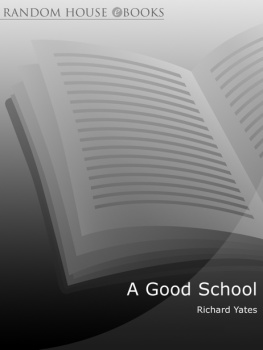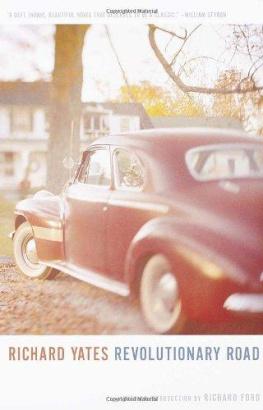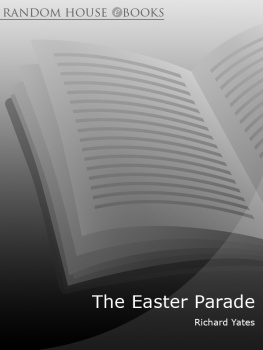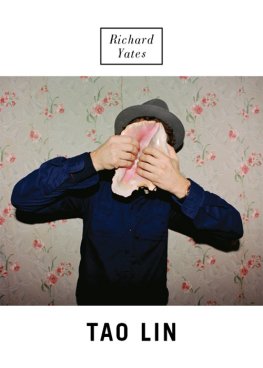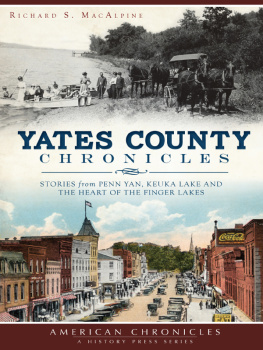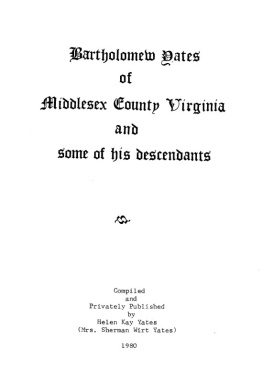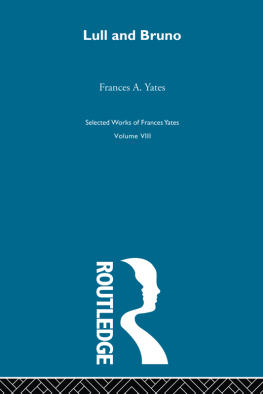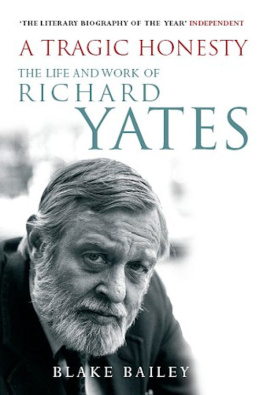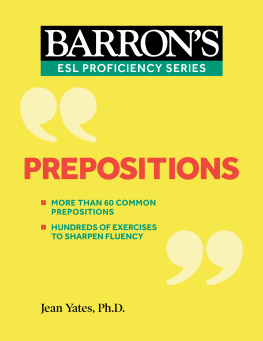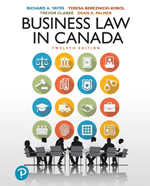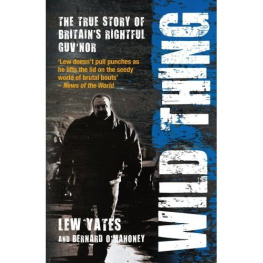Richard Yates - A Good School: A Novel
Here you can read online Richard Yates - A Good School: A Novel full text of the book (entire story) in english for free. Download pdf and epub, get meaning, cover and reviews about this ebook. year: 2001, publisher: Picador, genre: Detective and thriller. Description of the work, (preface) as well as reviews are available. Best literature library LitArk.com created for fans of good reading and offers a wide selection of genres:
Romance novel
Science fiction
Adventure
Detective
Science
History
Home and family
Prose
Art
Politics
Computer
Non-fiction
Religion
Business
Children
Humor
Choose a favorite category and find really read worthwhile books. Enjoy immersion in the world of imagination, feel the emotions of the characters or learn something new for yourself, make an fascinating discovery.
- Book:A Good School: A Novel
- Author:
- Publisher:Picador
- Genre:
- Year:2001
- Rating:3 / 5
- Favourites:Add to favourites
- Your mark:
- 60
- 1
- 2
- 3
- 4
- 5
A Good School: A Novel: summary, description and annotation
We offer to read an annotation, description, summary or preface (depends on what the author of the book "A Good School: A Novel" wrote himself). If you haven't found the necessary information about the book — write in the comments, we will try to find it.
A Good School: A Novel — read online for free the complete book (whole text) full work
Below is the text of the book, divided by pages. System saving the place of the last page read, allows you to conveniently read the book "A Good School: A Novel" online for free, without having to search again every time where you left off. Put a bookmark, and you can go to the page where you finished reading at any time.
Font size:
Interval:
Bookmark:
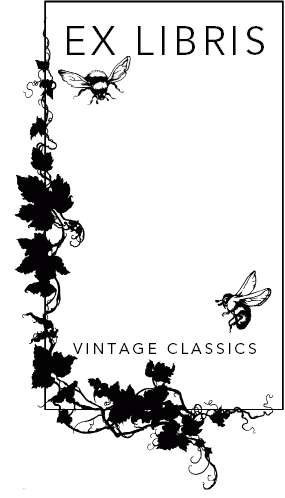
A GOOD SCHOOL
Richard Yates was born in 1926 in Yonkers, New York. After serving in the US Army during the Second World War, he worked as a publicity writer for the Remington Rand Corporation, and for a brief period in the sixties as a speech-writer for Senator Robert Kennedy. His prize-winning stories first appeared in 1953 and his first novel, Revolutionary Road, was nominated for the National Book Award in 1962. He is the author of eight other works, including the novels A Good School, The Easter Parade and Disturbing the Peace, and two collections of short stories, Eleven Kinds of Loneliness and Liars in Love. Richard Yates was twice divorced and the father of three daughters. He died in 1992.
ALSO BY RICHARD YATES
Revolutionary Road
Eleven Kinds of Loneliness
A Special Providence
Disturbing the Peace
The Easter Parade
Liars in Love
Young Hearts Crying
Cold Spring Harbor
The Collected Stories of Richard Yates
RICHARD YATES

This eBook is copyright material and must not be copied, reproduced, transferred, distributed, leased, licensed or publicly performed or used in any way except as specifically permitted in writing by the publishers, as allowed under the terms and conditions under which it was purchased or as strictly permitted by applicable copyright law. Any unauthorised distribution or use of this text may be a direct infringement of the authors and publishers rights and those responsible may be liable in law accordingly.
Version 1.0
Epub ISBN 9781446420591
www.randomhouse.co.uk
Published by Vintage 2007
2 4 6 8 10 9 7 5 3 1
Copyright Richard Yates 1978
Richard Yates has asserted his right under the Copyright, Designs and Patents Act 1988 to be identified as the author of this work
This book is sold subject to the condition that it shall not, by way of trade or otherwise, be lent, resold, hired out, or otherwise circulated without the publishers prior consent in any form of binding or cover other than that in which it is published and without a similar condition, including this condition, being imposed on the subsequent purchaser
First published in the United States in 1978 by Delacorte Press/Seymour Lawrence
First published in Great Britain in 2006 by Methuen Publishing Ltd
Excerpts from this work first appeared in The New York Times Book Review and Decade magazine
Grateful acknowledgement is made to Campbell, Connelly & Co. Ltd, for permission to quote from the lyrics of Good Night Sweetheart by Ray Noble, Jimmy Campbell and Reg Connelly. Copyright 1931, renewed 1959 by Campbell, Connelly & Co. Ltd, London, England. Rights throughout the United States and Canada controlled by Robbin Music Corporation, New York, N.Y. Used with permission. All rights reserved.
Vintage
Random House, 20 Vauxhall Bridge Road,
London SW1V 2SA
www.vintage-classics.info
Addresses for companies within The Random House Group Limited can be found at: www.randomhouse.co.uk/offices.htm
The Random House Group Limited Reg. No. 954009
A CIP catalogue record for this book is available from the British Library
ISBN 9780099518587
To the memory of my father
Draw your chair up close
To the edge of the precipice
And Ill tell you a story.
F. Scott Fitzgerald
As a young man, in upstate New York, my father studied to be a concert tenor. He had a fine, disciplined voice that combined great power with great tenderness; hearing him sing remains the best of my early memories.
I think he sang professionally a few times, in places like Syracuse and Binghamton and Utica, but he wasnt able to make a career of it; instead he became a salesman. I imagine he joined the General Electric Company in Schenectady as a delaying action, in order to have a few dollars coming in while he continued to seek concert engagements, but before very long the company swallowed him up. By the time he was forty, when I was born, he had long since come down to the city and settled into the job he would hold for the rest of his life, that of an assistant regional sales manager for the Mazda Lamp Division (light bulbs).
People still asked him to sing at social gatherings Danny Boy seemed to be the popular favorite among request numbers and sometimes he did, but more and more often in later years he would decline. If pressed, he would take a backward step and make a little negative wave of the hand, smiling and frowning at the same time: all that, he seemed to say Danny Boy; the years upstate; singing itself all that was in the past.
His office in the General Electric building was barely big enough to contain a desk and a framed photograph of my older sister and myself as small children; it was in that cubicle that he earned however much money it took to send my mother what she asked for every month, year after year. They had been divorced almost as long as I could remember. He greatly loved my sister I think that must have been the main reason for his unflagging generosity to us but he and I, after I was eleven or so, seemed always bewildered by each other. There seemed to be an unspoken agreement between us that, in the dividing process of the divorce, I had been given over to my mother.
There was pain in that assumption for both of us, I would guess, though I cant speak for him yet there was an uneasy justice in it too. Much as I might wish it otherwise, I did prefer my mother. I knew she was foolish and irresponsible, that she talked too much, that she made crazy emotional scenes over nothing and could be counted on to collapse in a crisis, but I had come to suspect, dismally, that my own personality might be built along much the same lines. In ways that were neither profitable nor especially pleasant, she and I were a comfort to one another.
The art of sculpture and the idea of aristocracy had always appealed to her equally, and so, after the divorce, she became a sculptor who longed to have rich people admire her work and accept her into their lives. Both her artistic and her social ambitions were forever thwarted, often in humiliating ways, but there were occasional tantalizing moments when everything seemed to be coming together nicely for her.
One of those times occurred in May or June of 1941, when I was fifteen. For the past year or so she had conducted a small weekly sculpture class in her studio, which was also the living room of our Greenwich Village apartment, and one of her students was a rich girl of exceptional beauty and charm named Jane. I think Jane must have romanticized my mother as a struggling artist, as many people seemed to do (I did too); in any case, upon dropping out of the sculpture class to get married, she invited us to attend the wedding.
It was a real Society wedding, held outdoors on Janes parents enormous lawn in Westchester County, and wed never seen anything like it. The groom was almost as stunning as the bride, a young naval officer in a flawless white uniform with a choker collar and stiff black-and-gold epaulets. There was an orchestra, there was a dance floor on a specially-built platform trimmed with white canvas, and there were what seemed hundreds of lovely girls who danced with their partners as soon as Jane and her naval officer had used his fiercely gleaming sword to cut the cake.
I was wearing a cheap, big-shouldered winter suit, badly outgrown, that my father had bought for me at Bonds in Times Square. And if I was uncomfortable, I hate to imagine how my sister must have felt: she was only about a year younger than Jane; she knew none of these splendid boys and girls; her clothes must have been every bit as wrong as mine; and still she trailed along with me after our mother, smiling, moving from one cluster of chattering guests to another over those acres of lawn, nibbling tiny watercress sandwiches.
Next pageFont size:
Interval:
Bookmark:
Similar books «A Good School: A Novel»
Look at similar books to A Good School: A Novel. We have selected literature similar in name and meaning in the hope of providing readers with more options to find new, interesting, not yet read works.
Discussion, reviews of the book A Good School: A Novel and just readers' own opinions. Leave your comments, write what you think about the work, its meaning or the main characters. Specify what exactly you liked and what you didn't like, and why you think so.

